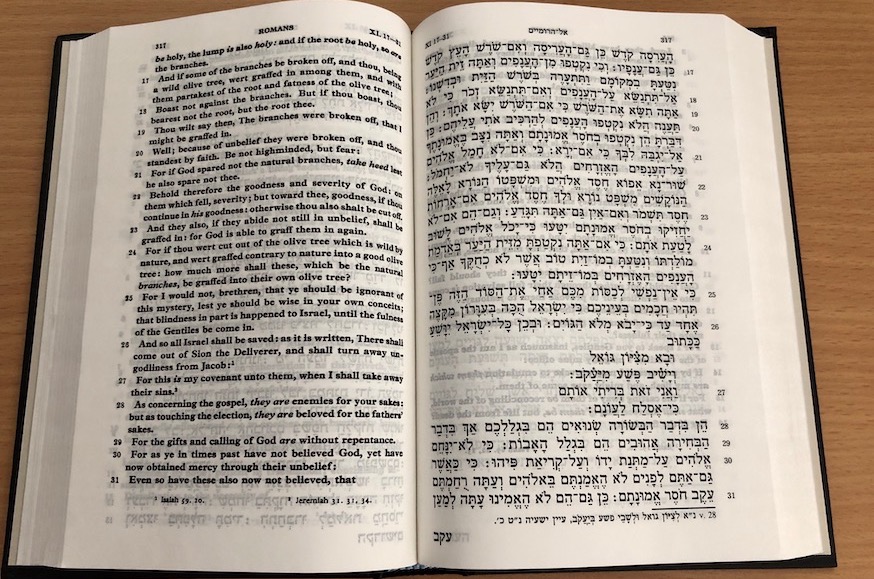Bible Versions and Israel
Over the last decades, numerous versions of new Bible translations have been published. Bible Societies want to translate the Bible as a more and more understandable book for a broader public. But translating also means interpreting. Does the original meaning of the text in its Hebrew or Greek language remain, or has it been replaced by something else? Let us see what happened with two Bible passages that explicitly speak about Israel: Romans 11:28 and Galatians 6:16.
Romans 11:28
“As concerning the gospel, they are enemies for your sakes: but concerning the election, they are beloved for the sake of the fathers” (New King James Version). The Jewish people are called “enemies for your sakes”. So their enmity concerning the gospel has a divine purpose – it is for our sake, that is, to benefit the Gentiles spiritually. But concerning the election, they remain beloved. In verse 32, Paul concludes about the Jewish people that God will have mercy upon all. So their being “enemies” is limited, instrumental and temporary. But how do the more recent Bible versions translate this passage?
Good News Translation (GNT) says: “Because they reject the Good News, the Jews are God’s enemies for the sake of you Gentiles. But because of God’s choice, they are his friends because of their ancestors.” Here suddenly the Jews are being called: “God’s enemies’” That’s a huge allegation. The original Greek text does not say enemies “of God”. That is really an addition. By using the word ‘enemies’ Paul indicates some kind of enmity between the gospel and the Jewish people, but he does not call them enemies of God. That would be something totally different, and of a deeper dimension. The GNT also mentions the reason why: “Because they reject the Good News”. That is not a translation, but an interpretation and addition. And what implications are such additions intended to have in the minds and heads of the readers?
Are the translators trying to put the Jewish people in a negative light and suggest that their role has been played out? Further, “beloved” (from the Greek agapè) has been degraded to “friends”.
The New Revised Standard Version (NRSV) also calls the Jews: “enemies of God’’.
The English Standard Version (ESV) also has a so-called ‘Anglicised Version’ (ESVUK), and this version also translates this passage as “enemies of God”.
Galatians 6:16
“And as many as walk according to this rule, peace and mercy be upon them, and upon the Israel of God” (New King James Version). Paul warns his readers in this chapter not to “boast in your flesh”, but “in the cross of our Lord Jesus Christ”. He emphasises it is all about being “new creation in Christ’” Then Paul says: “as many as walk according to this rule, peace and mercy be upon them”. And then he follows saying: “and upon the Israel of God”. So by using the word “and” Paul makes a distinction between those who follow this rule and Israel of God. Both receive peace and mercy. So the church as the body of Christ and Israel are distinct, and both receive peace and mercy. Israel has not been replaced by the church. But how do the more recent Bible versions translate this passage?
The New International Version (NIV) says: “Peace and mercy to all who follow this rule—to [b] the Israel of God’”. The word “and” (the Greek kai) has been removed. So “the Israel of God” is now not any more distinct but only a description or a specific indication of “those who follow this rule”. Only in a footnote, they add the word “and” as another option. This can be interpreted as if the church is now the new Israel.
The Revised Standard Version (RSV) says: “Peace and mercy be upon all who walk by this rule, upon the Israel of God.” Here the word “and” has also been removed, by which the Israel of God has been reduced to just a description of the former.
Good News Translation (GNT) says: “As for those who follow this rule in their lives, may peace and mercy be with them—with them and with all of God’s people!” Here even “Israel” has disappeared and been replaced by “all of God’s people”, whoever that may be.
You don’t need to be a theologian to conclude that those translators had something in mind concerning Israel. Making the Bible more understandable and accessible for a broader public is a very good intention. But concerning Israel and the Jewish people, passages have been changed, and words have been removed, which have nothing to do with making the Bible more understandable.
So we have to be cautious in our choice of which Bible version to use. I suggest the following test: “Does my favourite Bible version honestly reflect the meaning of the original Hebrew or Greek text”?






